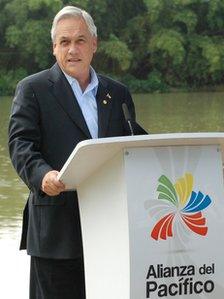Latam 'gang of four' agree to scrap trade tariffs
- Published

Chile's president: "Probably the most successful" integration in Latin America's history
Four of the fastest growing economies in Latin America agreed on Thursday to scrap most of the tariffs on trade between their countries.
Chile, Colombia, Mexico and Peru, the founder members of the Pacific Alliance trading bloc, said the deal would eliminate 90% of merchandise tariffs between the nations within months.
They said the remaining 10% would go by the end of the decade.
The four hailed the move as an historic step towards regional integration.
The countries also agreed to abolish the need for tourist and business visas, allowing their citizens, which have a combined population of 210 million people, to travel more easily between the four countries.
Excitement
"We think the Pacific Alliance is probably the most successful experience of integration that Latin America has had in its history," Chilean President Sebastian Pinera told reporters at an Alliance summit in the Colombian city of Cali.
The Alliance was only formed last year, but has already drawn praise and interest from company executives and politicians. Some regard it as the most exciting business development in the region for years.
If combined, the four countries would have the ninth biggest economy in the world, with around 2.7% of global economic output.
They account for a third of Latin American gross domestic product (GDP) and half of the region's trade with the rest of the world.
Watchers
Costa Rica has formally asked to join the bloc. Countries as diverse as Canada, Japan, New Zealand, Australia and Uruguay have been granted observer status and even Spain, France and Portugal - not known for their Pacific coastlines - say they want to get involved.
The Peruvian and Chilean economies were the fastest growing in South America last year, expanding by 6.3% and 5.6% respectively. The Colombian and Mexican economies grew more slowlym but still outstripped the regional average.
All four countries are outward looking, with a particular interest in Asian markets. Chile has more free trade agreements in place than any other country in the world and Mexico is not far behind.
The dynamism of the Alliance contrasts with Latin America's other major trade bloc Mercosur.
It was set up in 1991 by Argentina, Brazil, Paraguay and Uruguay, and after showing initial early promise has since become bogged down by protectionism and political disputes.
Tourism
Mercosur's failure to agree a free trade agreement with the European Union is indicative of its shortcomings. The two sides have been discussing one off and on for the past 18 years.
Mr Pinera said that apart from the deals on tariffs and visas, the Alliance leaders discussed cooperation in the fields of education and tourism, as well as further integration of their stock exchanges.
He said the four nations were increasingly sharing their embassies in countries where they did not all have an ambassadorial presence.
At the end of the summit, Colombia assumed its rotating presidency from Chile.
- Published23 May 2013